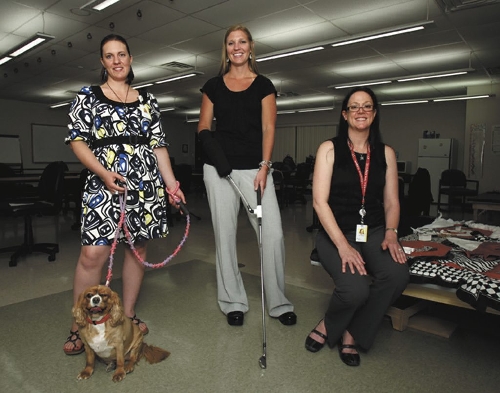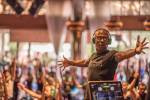Touro University students show off inventions to help the disabled
If a soldier who loves golf has an arm blown off in Iraq or Afghanistan, Amanda Hedberg feels sure the question of whether they can play the game again will come up.
When someone truly enjoys participating in an activity, said the student studying to be an occupational therapist, it only stands to reason that an individual would want to continue with it, despite physical limitations.
"Research has repeatedly shown that if someone can't go out and do what they used to do with their buddies, high-level depression sets in," Hedberg said as she stood in a classroom at Touro University.
Drinking and drugs and the threat of suicide, she noted, can become a real threat.
That Hedberg would be thinking in such fashion -- and coming up with a way to help someone without an arm continue to play the game they love -- is not unusual in Dr. Yvonne Randall's class in assistive technologies and adaptive devices.
"Our goal in occupational therapy is to help clients who suffer from a mentally, physically, developmentally or emotionally disabling condition have the most independent, productive and satisfying lives possible," Randall said. "In this class they have to create something, that can help someone be independent. It is something that occupational therapists often have to do."
How Hedberg got her idea for her project isn't that unusual when you consider her background.
Her fiancé, a National Guardsman who served in Iraq, knew a soldier who lost his arm in an explosion. And Hedberg went to Boise State University in Idaho on a golf scholarship.
"I think it's realistic to think this is a problem that will come up, if it hasn't already," Hedberg said as she held a bendable, swingable device she made that attaches to a prosthesis and golf club. "Golfers really love the game and don't want to give it up."
Hedberg's device is one of several student inventions that will be on display from 9 a.m. to 11 a.m. Thursday at the Touro campus in Henderson, 874 American Pacific Drive.
Other devices help people with arthritis -- seat belt and dog leash modifications that enable people with stiff fingers to both buckle up and put a leash on a collar -- and children with vision problems: a play mat that helps teach a child how to button, zip and tie shoes.
Since 2007, students have invented a voice activated reminder for a person with Alzheimer's to wash their hands after going to the toilet and camera modifications for a person with a spinal cord injury who is unable to use their arms and hands.
"The students are creative but practical in designing assistive devices that can really make a difference in the Southern Nevada community and beyond," said Randall, who oversees the two-year master's program in occupational therapy.
Metal piping, clamps, vinyl hose and pipe threads used by Hedberg to create the device to help a one-armed golfer cost her less than $5. She isn't sure how it compares to commercial devices for amputees that cost hundreds of dollars. Both feature flexible coupling, duplicating wrist action required for a smooth, controlled swing.
"It hasn't gotten a good test yet," she said. "As an occupational therapist, you let people know what's available. Sometimes they can afford it or their insurance doesn't cover it, and then the therapist will come up with something."
Hedberg said she expects to work in a VA hospital once she gets licensed as an occupational therapist. Many men are coming back from war with permanent disabilities, she said.
"I want to help them all I can," she said. "They deserve that."
Part of her work would include demonstrating the use of adaptive equipment, including wheelchairs, eating aids and dressing aids. She would also design or build special equipment needed at home or at work, particularly computer-aided adaptive equipment.
"You want to do things as simply and inexpensively as possible," she said.
For just a few dollars, Caroline Smith-Anderson made a dog leash that is easier for an arthritic family friend to grip. Most dog leashes require dexterity in the fingers, both to hold the leash at the end and to attach it to the collar.
Smith-Anderson's device has grips for two hands and a large clamp -- a carabiner that rock climbers use -- to attach the leash to the collar.
Smith-Anderson thinks she may use her occupational therapy expertise to help autistic children.
"Handwriting is a big area that you work in with autistic children," she said. "But the truth is, I would like to help many kinds of people as an occupational therapist."
With disabled children, therapies often include facilitating the use of the hands and promoting skills for listening, following directions, social play, dressing or grooming. Occupational therapists who work with the elderly may assess homes for hazards and identify environmental factors that contribute to falls. In mental health settings, occupational therapists help people deal with daily life, working with clients on budgeting, time management, shopping, homemaking and the use of public transportation.
According to the U.S. Bureau of Labor Statistics, employment for occupational therapists is expected to grow faster than average, and job opportunities for those who work with the aging population will be especially good.
"What got me interested in occupational therapy is that it involves so many things and people," said Teena Marshall, 45, who was a "Jubilee" dancer at Bally's for 10 years before having a family and going to college.
"I like helping people live their best life," she said.
Marshall said she has particularly enjoyed working with children in her therapy training.
Her colorful sensory mat project helps visually impaired children work with buttons, zippers and tie shoes as well as get used to different textures. Her mat cost less than $50, while commercial mats often cost more than $300.
Marshall said she enjoyed the applause she received as a dancer but thinks the thanks an occupational therapist gets is more rewarding.
"When a family thanks you for helping their disabled child learn how to do things by himself, that is applause that will always stay with you," she said.
Contact reporter Paul Harasim at
pharasim@reviewjournal.com or 702-387-2908.




























